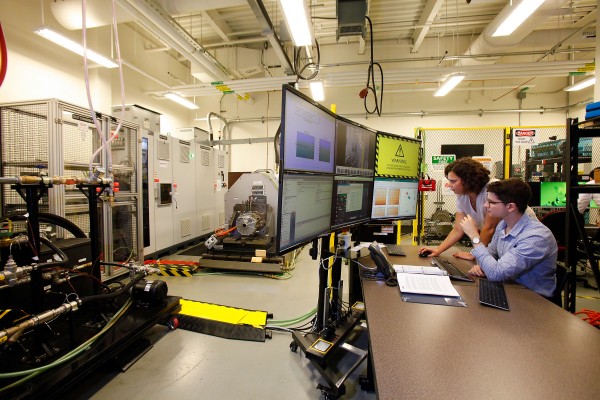 Researchers in UWindsor’s Centre for Hybrid Automotive Research and Green Energy work on a state-of-the-art EV electric motor test system that will be used to conduct next-gen electric vehicle research.
Researchers in UWindsor’s Centre for Hybrid Automotive Research and Green Energy work on a state-of-the-art EV electric motor test system that will be used to conduct next-gen electric vehicle research.
An injection of nearly $4.3 million in federal and industry funding will spur University of Windsor next-gen electric vehicle research conducted in collaboration with the Canadian auto industry.
A multidisciplinary team of University of Windsor researchers led by the Faculty of Engineering’s Narayan Kar has received funding from the Natural Sciences and Engineering Research Council of Canada (NSERC) in the amount of $1.9 million with additional industry cash and in-kind investment of $2.4 million to develop lightweight, compact, aluminum-intensive induction motors for electric vehicles as well as motor testing technologies.
These high-efficiency, high-performance motors have the potential to significantly reduce costs and extend the driving range of electric cars to meet aggressive 2025 traction motor targets set by the U.S. government, automakers and energy companies.
Ford Motor Company of Canada, D&V Electronics, and Nemak are partnering on and providing funds toward the research project that includes UWindsor experts in materials, electrical, mechanical, thermal, and software engineering.
Recent trends show electric vehicle manufacturers adopting multi-motor, all-wheel drive systems to increase driving range and performance. However, to support mass market adoption of these technologies, Dr. Kar says there is a critical need to develop motors that are high-performing, compact, lighter, cost-effective, and easily manufacturable.
“This collaboration aims to directly address these needs by developing lightweight, multi-material, and high-efficient traction motors with improved thermal and structural integrity,” he adds.
Nemak will cast the developed motor components using its new proprietary, high-strength, electrically conductive aluminum alloy, and D&V Electronics will help assess the new motors using advanced testing technologies. The final result will then be integrated into next generation electric vehicles.
“Nemak is contributing the materials expertise that will guide opportunities for lightweighting and creating an aluminum-intensive electric motor solution,” says Glenn Byczynski, Nemak’s manager for research and development.
D&V Electronics will then step in by providing testing equipment and expertise to examine the motors.
“D&V’s test equipment and over 10 years of testing electric vehicle propulsion knowledge, competence, and experience will allow for quick, effective, and comprehensive evaluation,” says Will Clandfield, engineering manager at D&V.
In addition, the project will train approximately 40 students from undergraduate to post-doctoral fellows.
“Our students will acquire research expertise and capabilities by interacting with supporting organizations to advance induction motor and automated motor testing technologies and to help propel a paradigm shift in overall electric vehicle design,” says Kar, who leads UWindsor’s Centre for Hybrid Automotive Research and Green Energy.
Six UWindsor researchers will contribute to the project, including Xueyuan Nie, Henry Hu, and Ofelia Jianu from the Department of Mechanical, Automotive and Materials Engineering; dean Mehrdad Saif from the Department of Electrical and Computer Engineering; Nick Vukotic from the Department of Chemistry and Biochemistry; and Ziad Kobti, director of the School of Computer Science.
The project is funded through an NSERC Alliance Grant, which encourages university researchers to collaborate with private, public, or not-for-profit sector organizations to generate new knowledge and accelerate the application of research results.
“I am absolutely delighted that NSERC has awarded Dr. Kar, his colleagues, and his industrial partners this Alliance Grant to pursue next-generation electric vehicle research,” says K. W. Michael Siu, UWindsor’s vice-president of research and innovation.
“I am confident that this industry-academia collaboration will result not only in crucial electric vehicle technological innovations of significant benefit to our private sector partners, but in eventual societal and economic gains to the Canadian public.”
—Kristie Pearce
